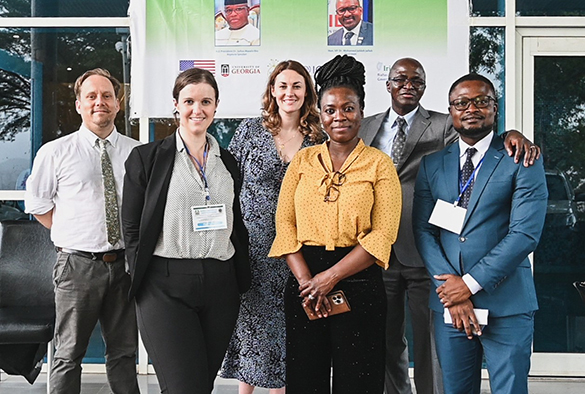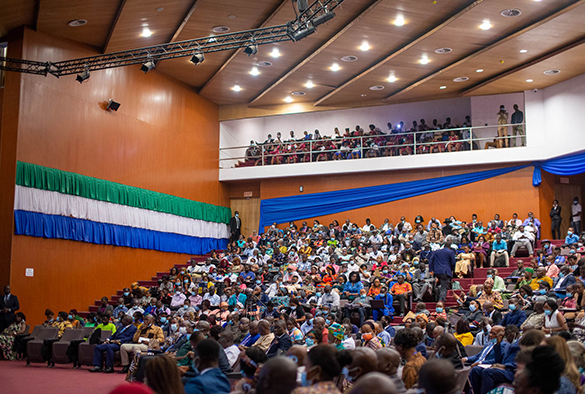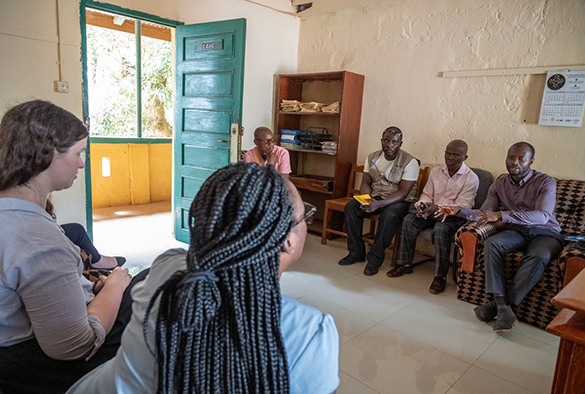
APRIES Team: (from left) Andre Gallant, Claire Bolton, Helen Bryant, Aicha Traore, David Okech, Umaru Fofanah
Helen Bryant is the Policy Officer for the African Programming and Research Initiative to End Slavery (APRIES), a collaborative research project between the University of Liverpool and the University of Georgia. APRIES’ goal is to reduce the prevalence of modern slavery in Sub-Saharan Africa (SSA) by transforming the capacity of community-engaged agencies to implement prevention, prosecution, and protection strategies.
I recently returned from a trip to Sierra Leone, where my key purpose was to attend the National Conference on Trafficking in Persons which took place in Freetown. This conference, hosted by the Ministry of Social Welfare in partnership with the Office of the President, focused on ‘Strengthening National Frameworks and Stakeholder Networks to STOP Modern Slavery’.
Participants came from multiple stakeholder groups, and included His Excellency President of Sierra Leone Dr Julius Maada Bio and the First Lady Madam Fatima Maada Bio. Also in attendance were the Minister of Social Welfare, the Minister of Justice, Attorney General, representatives from the ECOWAS Commission, International Organisation for Migration (IOM), and Ambassadors from Ireland, EU, and USA, and global and local NGOs.

Delegates in attendance to the National Conference of Trafficking in Persons
As part of the programme of events, Dr David Okech, Director of APRIES, had the opportunity to present on the work which we have been doing in Sierra Leone. The Africa Programming and Research Initiative to End Slavery (APRIES) programme – of which University of Liverpool is a partner – secured $15.75 million from the US Department of State in 2019.
Dr Okech’s presentation encompassed promoting the newly published base line research and accompanying policy recommendations, which were shared with the delegation. Further to this presentation, our colleague Umaru Fofanah, gave a presentation on the work he is supporting with our partners at World Hope International – our implementation partners on the ground in Sierra Leone. Participation in this conference gave APRIES and myself a great opportunity to further develop and harness our relationships with leading policy makers and stakeholders working on ending modern slavery in Sierra Leone.
Furthermore, this trip included opportunities to meet and discuss our work with local administrators in the field.

Clockwise from left: Claire Bolton (Assistant Director of APRIES); Mohammed S T Kamara (World Hope International); Matthew Turay (World Hope International), Assistant District Officer Emmanuel YD Kamara and Edmond E. Boucarie, Chiefdom Administration Officer; and Aicha Traore (APRIES Sierra Leone Programme Manager)
After a few days in Freetown, a group of us from APRIES headed further into the country to visit with Ministers and Paramount Chiefs in Kenema and Kailahun. We started our fieldwork meeting with Resident Minister Ret. Col. Kes Boya to discuss the next phase of APRIES, which includes implementation of activities which aim to reduce prevalence and increase prosecution of traffickers. It was encouraging to hear him speak so highly of our work and how it is making an impact so far.
Probably the most interesting conversation I had was with the Assistant District Officer Emmanuel YD Kamara and Edmond E. Boucarie, Chiefdom Administration Officer. We discussed how to effectively communicate policy to local communities in this district as we move forward with formalising Chiefdom Bylaws. Learning that policy changes are shared with community members through play acting and drama was encouraging as this connects with some previous work I have done on creative and arts based methods in anti-trafficking and modern slavery interventions through the Antislavery Knowledge Network.
Though my trip was short at only one week, it was packed full of opportunities to enhance the APRIES collaborative working practices which are essential to our success. My discussions with stakeholders during this time highlighted an important feature of our research: multi-agency partnership working is the key to making distinguishable impact in trafficking in persons in Sierra Leone.